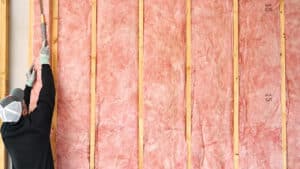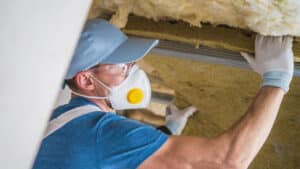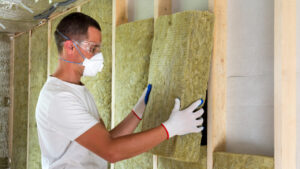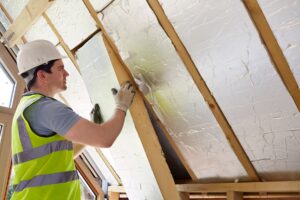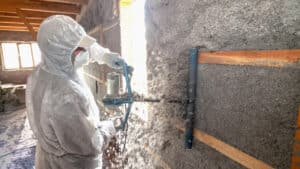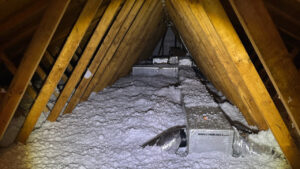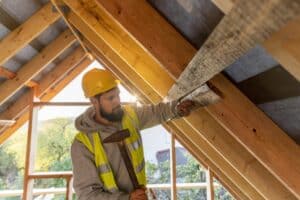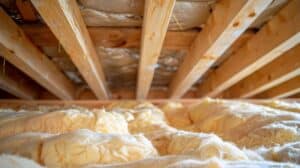Insulation and Moisture Control in Hampton Roads
Proper insulation is a key factor in maintaining a comfortable, energy-efficient home. However, many homeowners overlook the crucial role insulation plays in moisture control. At Universal Insulation, we understand the importance of addressing the relationship between insulation and moisture to prevent the growth of mold and mildew. In this article, we’ll explore how insulation and moisture interact, the signs of moisture-related insulation issues in a Hampton Road home, and the steps you can take to keep your home healthy and dry.
The Relationship between Insulation and Moisture
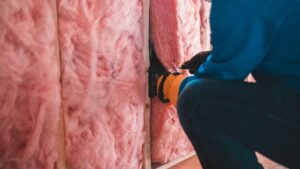
Insulation helps regulate temperature and humidity levels in your home. When installed correctly, insulation creates a vapor barrier that prevents warm, moist air from coming into contact with cool surfaces, which can lead to condensation. However, if insulation is damaged, missing, or improperly installed, it can actually contribute to moisture problems.
Poor insulation allows warm air to escape into cooler areas of your home, such as attics or walls. When this warm air hits a cold surface, it condenses, creating humidity. Over time, this humidity can accumulate, saturating the insulation and surrounding building materials. Wet insulation loses its R-value, which is a measure of its ability to resist heat flow. As a result, your home becomes less energy-efficient, and you may notice increased utility bills.
The Dangers of Mold and Mildew
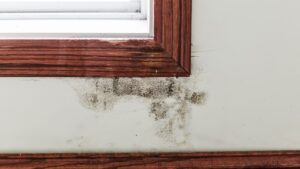
Mold and mildew thrive in damp, dark environments, making moisture-damaged insulation an ideal breeding ground. Exposure to mold and mildew can lead to various health risks, including respiratory issues, allergies, and other concerns. Individuals with pre-existing conditions, such as asthma or weakened immune systems, are particularly vulnerable to the effects of mold. Additionally, installing a vapor barrier can help prevent mold growth.
In addition to health risks, mold, and mildew can cause significant structural damage to your home. As these fungi grow, they deteriorate building materials, such as wood, drywall, and carpet. If left unchecked, mold and mildew can compromise the integrity of your home, leading to costly repairs and even rendering the space uninhabitable.
Thanks to the unrelenting humidity in our Virginia summers, our region is especially prone to the growth of mold and mildew. Part of every home visit we make is to ensure that the insulation is doing its job or inform the homeowner of possible breaches.
Telltale Signs of Moisture-Related Insulation Issues
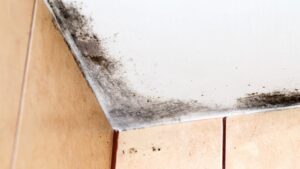
Recognizing the signs of moisture-related insulation problems is crucial for addressing the issue before it escalates. Some common indicators include:
1. Visible mold or mildew growth on walls, ceilings, or floors
2. Musty odors or persistent dampness in specific areas
3. Condensation on windows, pipes, or other surfaces
4. Peeling paint, bubbling wallpaper, or warping floorboards
5. Unexplained increases in energy bills due to compromised insulation
If you notice any of these signs, it’s safer to act quickly. Contact a professional insulation contractor, like Universal Insulation, to assess the situation and recommend the appropriate course of action.
Preventing Moisture-Related Insulation Problems
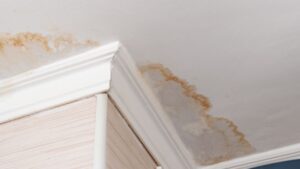
Preventing moisture-related insulation issues is far more effective than dealing with the consequences of mold and mildew growth. Here are some key strategies for keeping your insulation dry and your home healthy with a vapor barrier:
1. Ensure proper ventilation and air circulation: Adequate ventilation in attics, crawl spaces, and bathrooms helps remove excess moisture and prevent condensation. Use exhaust fans in kitchens and bathrooms and consider installing a whole-house dehumidifier to maintain optimal humidity levels.
2. Regularly inspect and maintain insulation: Periodically check your insulation for signs of moisture, mold, or damage. If you notice any issues, address them promptly to prevent further deterioration.
3. Address water leaks and sources of moisture: Fix leaky roofs, pipes, or windows as soon as possible. Ensure proper drainage around your home’s foundation to direct water away from the structure.
When to Replace Insulation Due to Moisture Issues
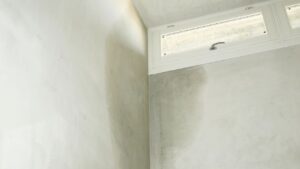
In some cases, moisture-damaged insulation may need to be replaced entirely. Consider replacing your insulation if:
1. Mold or mildew growth is extensive and cannot be safely remediated
2. The insulation material is saturated or has been wet for an extended period
3. The insulation has lost its structural integrity or insulating properties
4. The moisture source cannot be effectively eliminated
Replacing moisture-damaged insulation is a job best left to professionals. Attempting to remove moldy insulation yourself can lead to the spread of spores throughout your home, exacerbating health risks and increasing the scope of the problem.
The Benefits of Working with Insulation Professionals
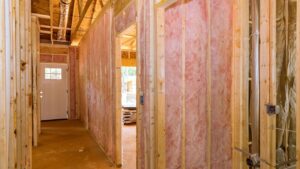
Partnering with experienced insulation professionals, like those at Universal Insulation, offers numerous benefits when addressing moisture-related insulation issues:
1. Thorough assessment of your home’s insulation and moisture control needs
2. Recommendations for the most appropriate insulation materials and solutions
3. Safe and effective removal of damaged or contaminated insulation
4. Expert installation of new insulation to ensure optimal performance
Our team at Universal Insulation Doctor has the knowledge, skills, and equipment to handle even the most challenging moisture-related basement problems. We’ll work with you to develop a customized solution that prioritizes the health and comfort of your home.
Conclusion
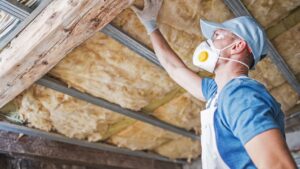
Addressing the relationship between insulation and moisture is essential for preventing the growth of mold and mildew in your home. By understanding the signs of moisture-related insulation issues and taking proactive steps to maintain your insulation, you can create a healthier, more energy-efficient living space.
If you suspect that your insulation has been compromised by moisture, don’t hesitate to contact the professionals at Universal Insulation Doctor. Our team is committed to providing top-quality insulation installation services that prioritize your home’s safety and comfort. Schedule a consultation today and take the first step towards a drier, healthier home.
As an added benefit, if you’re concerned about the air quality in your home, consider partnering with our sister company, Universal Duct Cleaning. Their expert technicians can inspect and clean your ductwork, helping to remove mold spores, dust, and other allergens that may be circulating through your heating and cooling system.
FAQ
Does insulation prevent moisture?
Yes, insulation prevents moisture by creating a layer between the outside temperature and inside temperature, preventing condensation.
How does moisture barrier work?
The moisture barrier in insulation works by creating a physical barrier to block water vapor from entering. It is usually polyethylene or other low-permeability matierial.
Why is the insulation under my house wet?
The insulation under your house is wet likely because of (1) moisture intrusion from the ground - you might have a leaky footing. (2) condensed humid air from the home can gather on the walls, especially in the summer. (3) You might have leaks from plumbing or your building envelope itself. Check for cracks and gaps. (4) Seasonal flooding or high groundwater levels may contribute. (5) Your moisture barrier was installed improperly on the warm side of the insulation. That allows moisture to enter and accumulate.

